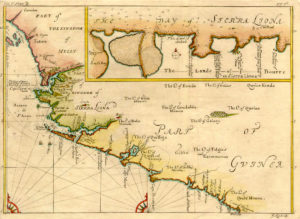
Johannes Kip, Map of Sierra Leone, 1732. University of Florida Map and Imagery Library
What can we learn about #VastEarlyAmerica from the archival collection at the very center of Anglo-imperial power?
Last week the Royal Archives at Windsor Castle opened access to the first tranche of materials in the Georgian Papers Programme. Because the Omohundro Institute is a primary US partner of the GPP, I’ve been working on the project for two years; we have funded fellowships and digital humanities work, and are deeply engaged in a whole range of this major undertaking. It’s important for all kinds of reasons I’ve written about over on the OI’s blog.
Now that the archival material is starting to appear online and fellows from the OI and King’s College are starting to write about their research, it’s time to think aggressively about the range of scholarship this archive can support. As an historian of women and political culture, I’m used to prying information from archives oriented toward men and formal politics. As a scholar of family in the early modern Atlantic, one of my models for thinking about how archives can yield histories of family that decenter colonizers is Ann Marie Plane’s Colonial Intimacies: Indian Marriage in Early New England.
But the papers of George III?
Aside from the important political aspects of the American Revolution, how do we find the history of the world beyond England in the papers of George III? And in the papers of the Georgian monarchs, including George III, newly digitized as part of the Georgian Papers Programme, how do we locate the histories of people and subjects that seem to be on the margins of these most powerful, privileged people in the early modern British Atlantic world? What could we possibly do to learn about people and subjects seemingly far from the center and yet still within the grip of imperial authority and policies? This is the ultimate reading against the archival grain challenge.
In part it’s easier–easy being relative–because of trailblazing work on turning the archives from a historian’s resource into a historian’s subject of analysis. It’s key to identify these trails, and how we can follow their lead. Scholars have been long indebted to Michel-Ralph Trouillot’s 1995 Silencing the Past: Power and the Production of History for illustrating the ways in which the history of the Haiti and its revolution was silenced by the very work of history. Haiti’s archival remnants and the historians for whom Haiti’s history seemed quite literally unthinkable silenced its story.
In just the last year, three publications stand out for me. First, a special issue of Social Text on “The Question of Recovery: Slavery, Freedom and the Archive” edited by Laura Helton, Justin Leroy, Max Mischler, Samantha Seeley and Shauna Sweeney includes a roundtable on archive and methods. Second, an issue of The History of the Present edited by Brian Connolly and Marisa Fuentes explores “From Archives of Slavery to Liberated Futures.” The essays in these two issues alone show the depth and breadth of work that can be done from working in—and working against–established archives. Third, Fuentes delineates in her remarkable new book Dispossessed Lives: Enslaved Women, Violence, and the Archive the ways that the structures of power reflected in archival knowledge can be so easily reproduced in scholarship. “Epistemic violence originates from the knowledge produced about enslaved women…and that knowledge is what survives in the archives.” Working against those structures requires an unwavering attention.
I hope we can explore the Georgian Papers with these guides in mind. How is this most elite of institutions shaping what we know, and how we know it? What is being said, or not, and in what frame, about the slave economy, colonialism, and abolition? Where can we find and map the connections of scientific correspondence with roots in native knowledge and communities? How can we extend the documentary materials on menus and food provisions to show the extensive connections and dependencies on the trade economy around and across the Atlantic? What can we learn about mental health and disability from one of the most fully chronicled (likely bipolar) cases? How can we pull the threads of fashion history to think in new ways about the history of the body and health? Some of the fellows for the Georgian Papers are already exploring these possibilities. Suzanne Schwarz has just written about beginning to discover the “Slave Trade, Slavery and Abolition in the Royal Archives, 1785-1810” and in particular divergent perspectives including those of the Duke of Clarence and his role in the African Institution and Sierra Leone.
Beyond the topics we explore, for me a vital question is how we can use this opportunity of archival creation (which is what’s happening as these documents become digitized and cataloged) to consider how we will work with and also how we might shape this archive. As scholars and librarians working together at the OI, William & Mary and King’s start to map digital projects, I think there is enormous potential in the Georgian Papers for archival and methodological ambition. Indeed, it will be a key measure of the Georgian Papers Programme that we are able to support that kind of ambition.
NB: The Georgian Papers Programme site for the US, for US-based work, and for #VastEarlyAmerica -focused scholarship and news is georgianpapers-us.wm.edu.

1 Comment
The National Archives and America's Founding Documents - Elizabeth M. Covart | Elizabeth M. Covart
at[…] Archives shape the way we view and interpret history. It’s something Jennifer Morgan and Peter Drummey reminded me of during our conversations for the “Doing History: How Historians Work” podcast series and something Karin Wulf talks about in her tweets and blog posts. […]